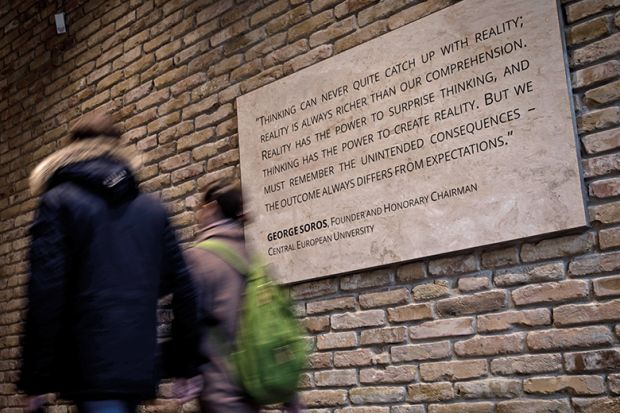On 24 June 2019, a hot summer’s day in Budapest, 60 newly minted PhDs and 486 new master’s students received their degrees from Central European University (CEU) amid an emotional crowd of family and friends.
This would be the last class to receive their CEU diplomas in the Hungarian city. The provost called the graduates “the most resilient generation of students in the history of the university” and the rector bade a symbolic farewell to Művészetek Palotája, the great concert hall where graduation ceremonies have been held for several years. From September 2019, all degree-related activities will be moving to the university’s new campus in Vienna, Austria.
The saga of the university is well known: in April 2017, the Hungarian government adopted amendments to the higher education law known as “Lex CEU” – including new rules requiring overseas universities operating in Hungary to maintain a campus in their home country. CEU, founded by Hungarian-born and US-based billionaire philanthropist George Soros, is co-accredited in Hungary and New York state, but, until recently, only operated in Budapest.
The university did everything in its power to fulfil the new legal requirements. In September 2017, the state of New York, where American programmes of CEU are accredited, offered to sign an agreement with the Hungarian government, as required by the new law.
Later that year, CEU also launched educational activities in the US, on the campus of Bard College in New York,
to fulfil the second requirement of the amendments.
However, the Hungarian government has neither signed the agreement with the state of New York nor has it acknowledged the educational activities in the US.
Despite national and international outcry against the law, it is still in place. The result is that, as of September 2019, CEU cannot offer its American degrees in Hungary.
So in March 2019, CEU announced the location of its new campus in Vienna. “This move to Vienna will give CEU a chance to grow, expand and prosper in the vibrant intellectual atmosphere of a great city,” CEU president and rector Michael Ignatieff said at the time.
The six-storey building in one of the most vibrant and multicultural Viennese neighbourhoods will serve as an interim campus until CEU can move into a permanent home. The 2019-20 year will be one of transition: incoming students will study on both campuses in Vienna and Budapest, whereas continuing students will complete their studies in Budapest (CEU retains its Hungarian accreditation until 2023).
By September 2020, the campus will host 1,500 students and the first undergraduate programmes at CEU in Austria. At the same time, CEU will maintain a strong presence in Budapest. At first a move that was steeped in negativity – the university was forced out of Budapest – it has evolved into an incentive for development and growth as CEU explores new opportunities in new locations.
But the CEU community is still processing a host of mixed feelings after the emotionally draining legal battle to keep the institution in Hungary.
On the one hand, there is gratitude. The outpouring of support from the academic world, both in Hungary and abroad, has been overwhelming. Thousands of students flooded the streets of Budapest to show their support for CEU and for academic freedom in Hungary. Thousands of letters of solidarity and calls to the Hungarian government to repeal Lex CEU poured in from individuals and universities in Hungary and around the world.
On the other hand, there is frustration. The reactions from European Union political institutions, which were called on to sanction attacks on academic freedom in the heart of Europe, have been ineffective so far.
And attacks on academic freedom in Hungary continue. After cutting universities’ financial autonomy and abolishing degrees in gender studies, in June this year the Hungarian parliament passed a law that gives the government greater control over the finances and personnel of the Hungarian Academy of Sciences, marking the end of an institution with over 150 years of excellence and academic freedom.
Protests in the streets continue, although with little effect.
For CEU this is a time for reasserting our commitments to promoting the values of an open society. The field of action for us has just become larger, spanning three countries: Hungary, Austria and the US.
In July, CEU received formal notification from the US Middle States Commission on Higher Education that the university successfully retained its accreditation status as a US degree-granting institution.
CEU will seek Austrian accreditation for its existing programmes at the Vienna campus, launch new programmes and capitalise on all the opportunities offered by the Austrian higher education landscape.
And the campus in Budapest will keep playing a significant research role in Hungarian academic life – a need that is greater than ever. Since the government increased its control over the Academy of Sciences, the possibilities for free academic research in Hungary have become very limited.
But, most importantly, the soul of the university was shaped in Budapest and will always be part of this beautiful city.
Monica Jitareanu is global partnerships officer at CEU and Agnes Leyrer is academic cooperations officer at CEU.
Register to continue
Why register?
- Registration is free and only takes a moment
- Once registered, you can read 3 articles a month
- Sign up for our newsletter
Subscribe
Or subscribe for unlimited access to:
- Unlimited access to news, views, insights & reviews
- Digital editions
- Digital access to THE’s university and college rankings analysis
Already registered or a current subscriber? Login




